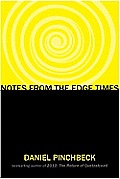
Those of us living in the fast lane of the information superhighway rapidly approach a maximum density of data and communication, a black hole where there is no signal left, and everything becomes noise. Under the force of this incessant barrage, our experience of being a person is undergoing a shift. Being inside of one's subjective self no longer feels particularly static or stable; our identity seems, instead, increasingly permeable, relational and relative. We discover that our personality gets perpetually shaped and reshaped by the flow of images and messages that press on us like a second skin or a high wind that blows against us. It becomes increasingly obvious that we are like cybernetic functions, only able to put back out what we first take in.
The ceaseless assault of new information in every area of study, so much of it seemingly so crucially important if we could only find the time to grasp it, shakes us from any presumed sense of certainty or authority. The deepening uncertainty, on so many levels, leads many people to regress, out of anxiety, into a reductive and simplistic mind-state. Rather than accept that they don't know anything, they pretend to believe in something, to identify with some ideology, political party, or religious faith, whether Transhumanism or Dominionism. As a saner but more stressful alternative, one can choose to remain open to the almost crushing cacophony of competing opinions, ideas, and viewpoints, which is best done by maintaining an inner detachment from all of it.
Our new tools of social media erode the boundary between private and public, self and other. These technologies flatten the depth dimensions of interiority and privacy that novels once celebrated and which defined the shape of bourgeois identity in the Modern West, once seen as the great achievement of modern culture. It is hardly productive to ask whether this is a healthy or unhealthy development, since it is clearly both. Above all, it is a change of state, a shift in perception and a reorientation within a new social landscape that our ever-evolving technology continues to reshape and reformat.
The visionary philosopher G. I. Gurdjieff distinguished between "essence," our original nature at birth, and "personality," what we become after essence is deformed by family patterns, the imprint of culture and society, and other factors. It was once very difficult to retrace our steps and recover the original openness we had before the world carved its mask over our face. Oddly, we may find this easier today than in previous eras.
Non-attachment is a concept common to Eastern metaphysics. Over the last century, Eastern philosophy has exerted an increasingly powerful influence on the modern Western psyche, a process that parallels the evolution of our media technologies. Buddhist and Vedanta philosophers welcome the alienation of the observer from what he observes as the basis of liberation. Eastern thought proposes the ego is ultimately an illusion, with no intrinsic existence. Fixated on the drama and dream of the ego, Western culture traditionally finds this separation between observer and observed to be unsettling, although in the age of information overload, it has become our natural state. Through what Jean Baudrillard called "the ecstasy of communication," our sense of identity becomes less dense and more supple, strangely impartial and almost impersonal.
Perhaps this is what "global enlightenment" will actually mean: As enough of us realize that our "body-mind organism" is purely determined in all of its thought and action, this leads to the end of our ability to identify with our personality, which causes liberation, or the extinction of ego, whether we want it or not. Once this awareness reaches a global scale, the party or the annihilation event still goes on as before according to the precise karmic sequence, like a mechanical ballet, but nobody is left around anymore to either enjoy or detest it.